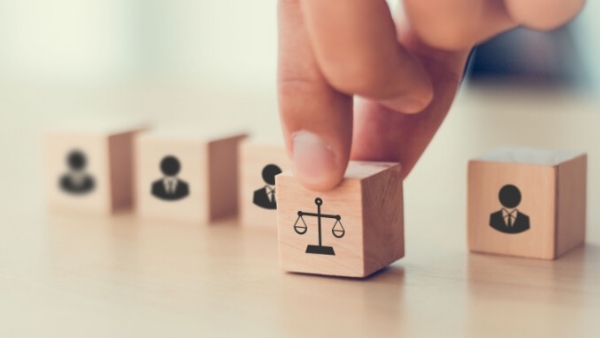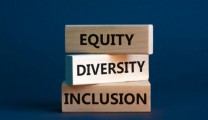Whether Luthra’s optimism is justified remains to be seen. The list of companies pulling back from DEI in the wake of Trump’s rhetoric and altering of practices within the federal government is growing and highlights the bigger problem.
Without those protections in place, what is the enforcement mechanism for preventing discriminatory hiring? Further, what impact will it have on organizational cultures?
At this point, any effort to answer these questions is essentially conjecture, regardless of where someone sits on the ideological spectrum. What we do know is that most of the changes related to Trump's policies are somewhat surface level thus far.
“ A lot of folks are in wait and see mode," Amri Johnson, Founder of Inclusion Wins, said. “Most people I've spoken to have changed their website, but they haven't changed everything they were doing. They're keeping their employee resource groups, but they're maybe not tying it so close to identity and welcoming people from outside those groups into them. Based on the most recent guidelines from the administration, what they're doing is not problematic.”
History Repeats Itself… or Does It?
Events over the last decade indicate that shifts in perception of the role businesses play in anti-discrimination efforts tends to swing with the events of the day.
The fact is, what is happening around DEI is about politics more than it is policy and HR teams considering abandoning it will do well to remember which game they’re having to play.
"This is all about politics," Johnson said. "This is not about creating the conditions (for fairness). This is not about organizational culture. Most of what we see right now is about politics. And unfortunately, some of the pro DEI, anti racism stuff that helped fuel this backlash was about politics too. It wasn't about really creating the right conditions, because if you were doing that, you would know you can't do that in a vacuum."
Prior to the police shooting of Michael Brown in 2014, DEI was growing, but less frequently discussed. After the events in Ferguson, the Overton Window around race in America shifted and a younger workforce that asked its employers to embrace socially conscious behaviors began to demand more.
And as the Black Lives Matter movement hit a fever pitch, so too did DEI’s influence within the business community. The pendulum had swung toward analysis of the impact things like employee resource groups (ERGs) had on culture and what could be done to mitigate bias in hiring processes.

The practice grew and grew, bringing in new cultural observances and education around diversity that was no longer just obligatory training, but more conscious attempts to help people be heard and seen within the workplace.
But eventually, that fervor died out and time passed. In May of 2020, DEI wasn’t all that high on many organizations' list of priorities. In fact, many were in the process of slashing budget for it as HR had bigger issues to deal with helping the business navigate a pandemic and a forced shift to remote work.
The pendulum swings
When George Floyd was brutally murdered on camera for all the world to see, the pendulum once again swung back the other way. The protests came, the performative responses from companies followed and demands for accountability for DEI efforts at companies big and small came too.
Suddenly you had waves of Chief Diversity Officer appointments being made and diversity consulting grew into an even bigger industry than it was before.
DEI was once again having its moment and companies who adopted it seriously began to evolve the practice. For those in it with an aim to shift workplace culture and go beyond acquiescence to social pressure, DEI was a strategic framework for ensuring that race, gender, sexuality, ability, age, religion and any other identity couldn’t be used as a way to deny someone work or a voice within the workplace.
Sounds great, right? Just one problem. The racial equity conversation some were focused on was not well received. The “candid conversations” companies held in the months following Floyd’s murder didn’t mend many bridges and a lot of those consultants used it as an opportunity to break out the soap box and make it about past struggles instead of what comes next.
When some within the DEI space walked through that door, the space they left behind wasn’t vacated, it was filled by contrarian voices who wanted to kill whatever momentum DEI had, and they used politics to bludgeon it. The reaction to that has also been political and now, the term DEI no longer refers to a strategy, it’s a hot button issue to avoid.

Technological Complexity and Bias
While some organizations have developed sophisticated bias control mechanisms and implemented technology-driven recruiting practices, the removal of regulatory standards creates a dangerous vacuum. Artificial intelligence and machine learning algorithms, already prone to perpetuating existing societal biases, could now operate with even less oversight.
For this reason, Johnson emphasizes the need to start with the data companies have at their disposal right now is an important first step.
"You need to use that data to understand your baseline," he said. "It's hard to say right now if regression will happen because I don't know if a lot of companies have put bias mitigation practices forward consistently. If companies are serious about using technology to combat it, the baseline data will help you see if there are certain types of bias in the system, how far back it goes, and what networks they're tapped into."
Tech companies and SaaS providers, increasingly contracted by federal agencies, now face reduced accountability in their hiring processes and it’s already proving to be a problem that AI is perpetuating gender and race stereotypes.
This is particularly concerning given the tech industry's historical challenges with diversity and inclusion.
But the jury is still out what the impact of AI will be on talent processes. On the one hand, there is cause for hope.
As Dr. Vijay Pendakur points out, the current workplace ecosystem is fraught with two critical challenges: bias and noise. Bias represents the brain's unconscious patterns that systematically disadvantage certain groups, while noise encompasses random errors in human judgment.
From performance evaluations to stretch assignments and sponsorship, workplace decisions are riddled with these invisible obstacles.
Generative AI presents a potential counterbalance, as the emerging human-machine partnership could offer a promising framework for more objective talent assessment.
At the same time, however, there’s definitely cause for concern, not least the culture of Silicon Valley itself.
“My skepticism and my hesitancy comes from the reality that in the move fast and break things vibe of Silicon Valley, where I spent a lot of time, many companies have trained their large language models using data that is loaded with bias and noise because the data comes from the human experience,” Pendakur said in an interview with the People Managing People podcast. “They're using the repository of human created data that reflects all of our baggage as a species, as a society. And so I'm nervous because we appear to be baking into the large language models our issues and problems because we're moving so fast.”









Replies to This Discussion